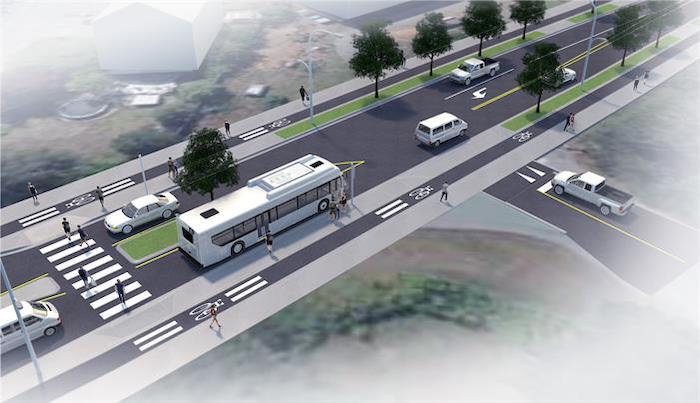
Nanaimo’s ‘complete streets’ engineering standards win awards
September 20, 2021
By CCE
The standards debuted with the city's Metral Drive project.
Nanaimo, B.C., is winning provincial, national and international awards for the new ‘complete streets’ transportation engineering standards its city council adopted in November 2020, which introduce raised local intersections to improve safety and accessibility.
Inspired by a similar approach in The Netherlands, the standards call for continuous sidewalks and bicycle lanes that remain raised as they cross road intersections. The goal is to shift the emphasis to motorists on slowing down and safely making a turn, so as to reduce the likelihood and severity of a collision with another vehicle, a pedestrian or a cyclist.
According to the BC Community Road Safety Toolkit, “raised crossings can reduce vehicle-pedestrian crashes resulting in injury by as much as 46% and reduce vehicle-bicycle crashes resulting in injury by as much as 51%.”
Raised and continuous sidewalks not only help calm multi-modal traffic, but also improve safety for visually and mobility-impaired pedestrians, who no longer need to navigate curb ramps.
Debuting the standards with its now-in-progress Metral Drive project (rendering pictured), Nanaimo has already won a 2020 Transportation Association of Canada (TAC) Sustainable Transportation Award, a 2021 Institute of Transportation Engineers (ITE) North American Complete Street Technical Achievement Award and, most recently, a 2021 Union of BC Municipalities (UBCM) Community Excellence Award for Sustainability.
“Road design standards have been largely unchanged for decades and now is the time to shift towards a friendlier, more sustainable transportation system,” says Leonard Krog, Nanaimo’s mayor. “Metral is now a concrete example of the future of Nanaimo’s roads.”
